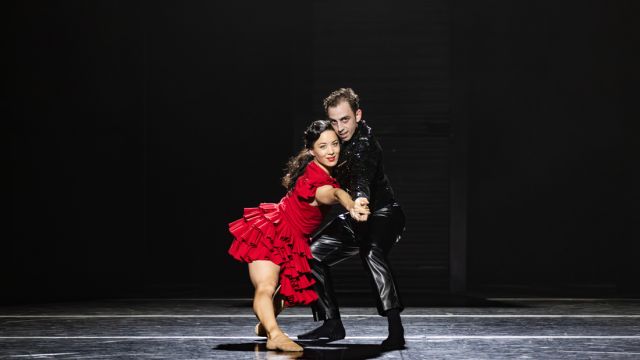Carmen
Johan Inger’s startling ballet Carmen shifts our focus from the famed femme fatale to the defeated Don Jose who swoons over her. Callum Linnane excels as the sexually uncertain prison guard – having to lock up Carmen – dancing tall and lyrical, then crumpled into angular gestures by his unrequited love.
Linnane is beautifully expressive of Inger’s cocktail of classical and contemporary movement (and music) in this dark psychoanalytical interruption.

Don Jose’s bullying commander Zuniga and the rock star toreador (Brett Chynoweth and Marcus Morelli respectively, both strong) may be successful rivals for Carmen, but still she refuses to be tamed by any man. Jill Ogai dances an inscrutable Carmen with quicksilver gusto, erotic and manipulative, rarely romantic.
Today an audience respects Carmen’s quest for sexual freedom but the original Spanish novella and Bizet’s 1875 opera decried her promiscuity for luring Don Jose to his downfall – even when it was he in a frenzy who stabs her!

Interestingly, Inger’s ballet, created on Spain’s Compania Nacional de Danza ten years ago, restores that old empathy for Don Jose, but here the villain is not Carmen’s resoluteness. It’s Inger’s so-called Smelling Dogs, packs of masked, black clad dancers urging on Don Jose’s fury, menacing him through the shadows, rapists representing all things hypermasculine in this patriarchal culture.
Carmen though begins with that thrilling Spanish exuberance as the under-paid female workers fight in Seville’s cigarette factory, then dance outside the gates, brazen and provocative, as the men leap like randy teenagers. The misogynist Dogs later carouse and celebrate Torero’s male prowess in the bullring, but the real world (with all of Carmen’s familiar Spanish sexism) shifts in act two to a metaphorical abstraction and, for Don Jose, paranoia.

Curt Allen Wilmer and Letica Ganan’s inventive stage design features ever mobile tall prisms with textured and mirrored surfaces, illuminating choreographic asides and later creating a terrifying forest for pack animals.
George Bizet’s sublime music reworked by Russian composer Rodion Schedrin with contemporary additions by Spain’s Alvaro Dominquez Vazquez and Marc Alvarez supports Inger’s choreographic fusion of styles and, similarly, David Delfin’s costumes draw on both flamboyant Spanish traditions and a stark Expressionism.

Inger introduces a young Boy (Lilla Harvey) as an ongoing witness to this damning lesson about bad male behaviour but it’s a glib and cosmetic addition. What is a brilliant choreographic and visual reinvention of Carmen finally stumbles into an overly simplistic and confused morality tale. Why is Carmen’s sexual freedom left celebrated while the bullfighter’s womanising is now damned as red meat for Smelling Dogs?
Luckily, it’s a thrilling journey.
Martin Portus
Photographer: Daniel Boud
Subscribe to our E-Newsletter, buy our latest print edition or find a Performing Arts book at Book Nook.

